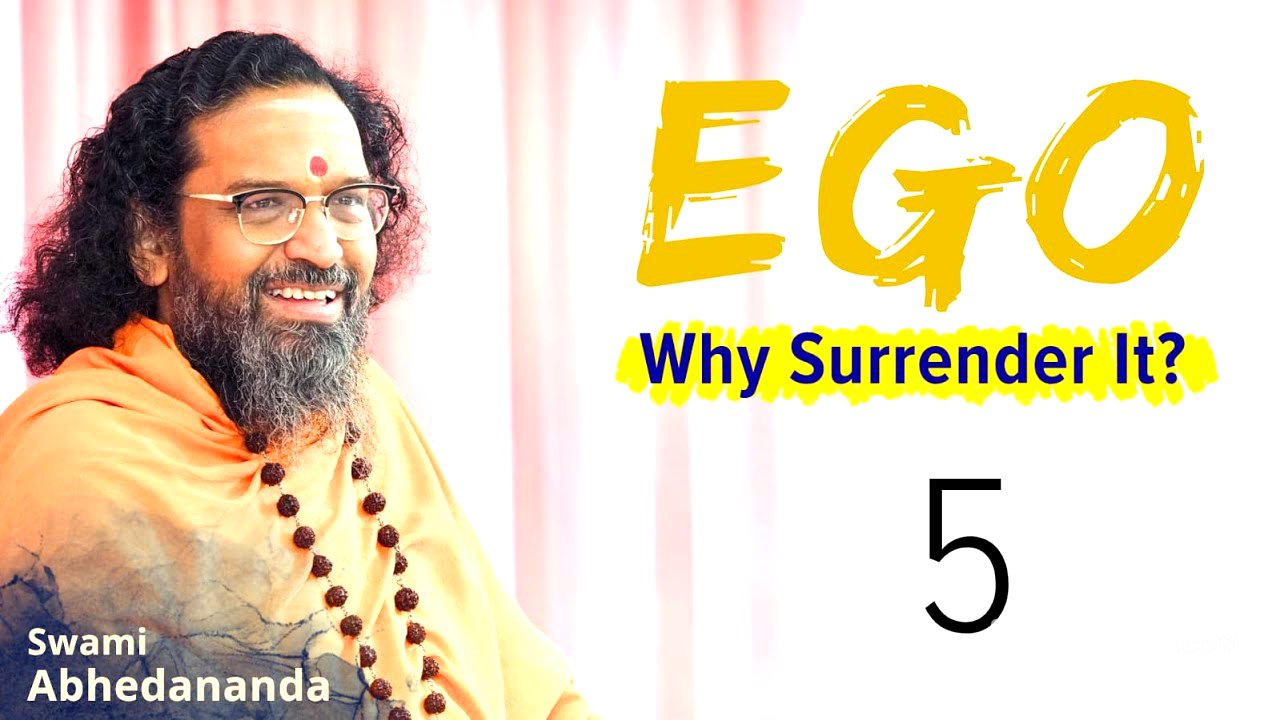TLDR;
This YouTube video by Chinmaya Mission South Africa features a discourse on the concept of surrender, drawing from Hindu scriptures and anecdotes. It emphasizes detaching from ego, dedicating actions to a higher power, and understanding the divine play in life's events. The talk references figures like Vishwamitra, Janak, and Parshuram from the Ramayana to illustrate different facets of surrender.
- Surrender involves detaching from ego and dedicating actions to a higher power.
- God's happiness and sorrow are different from human emotions, arising from Maya.
- The figures of Vishwamitra, Janak, and Parshuram exemplify different paths to surrender.
Om and Introductory Music [0:00]
The video begins with the chanting of "Om" and devotional music, setting a spiritual tone for the discourse. This opening serves as an invocation, creating an atmosphere conducive to reflection and understanding of the teachings that follow.
The Three Personalities Causing Sorrow [9:25]
The speaker identifies three sources of suffering: an uncontrolled mind, an ego-driven agenda, and ignorance of one's true nature. These personalities lead to imbalance and prevent true surrender. The uncontrolled mind disturbs our balance, the ego creates personal agendas, and ignorance obscures our understanding of our own nature.
The Cosmic Doer and the Power of Resolution [11:00]
The universe is vibrant with constant action, suggesting a cosmic doer behind it all. This doer possesses the power of resolution, which drives creation. Just as individual actions stem from thought and determination, the universe's activities are guided by a higher power's resolve.
God's Happiness and Sorrow Through Maya [14:37]
God experiences happiness and sorrow through Maya (illusion), which is distinct from pure consciousness that remains unaffected. These emotions arise from the title of Maya, influencing divine actions and reactions. Examples from the Mahabharata illustrate God's emotional responses to events, such as Duryodhan's actions and the disrobing of Draupadi.
Gentleness and Harshness of God [17:51]
God's nature varies from gentle to harsh depending on the situation. Krishna's interactions with Yashoda and Devki exemplify gentleness, while his actions during the Mahabharata war demonstrate harshness. Similarly, Ram's killing of Bali is cited as an example of harshness, contrasting with his generally compassionate nature.
God's Preferences and Detachment [22:19]
God is not pleased by attachment, hatred, or constant dissatisfaction. Instead, God favors qualities like contentment, determination, and dedication. The speaker emphasizes that God observes our actions and attitudes, preferring those who dedicate their efforts to a higher purpose.
Taking Shelter in God [23:58]
The Gita advises taking shelter in God (Madashraya), emphasizing reliance on the divine rather than seeking support elsewhere. This concept is likened to a husband desiring his wife to depend on him rather than seeking help from neighbors. The speaker stresses that God knows us intimately through many births and still accepts us.
Surrender Through Vishwamitra, Janak, and Parshuram [26:36]
The speaker introduces three figures from Hindu tradition who exemplify surrender: Vishwamitra, Janak, and Parshuram. Vishwamitra, a great ascetic, surrendered after witnessing Ram's power. Janak, a great scholar, surrendered when the bow broke. Parshuram, a great warrior, is about to surrender.
Dedication of Happiness and Expertise [28:41]
Dedication involves offering one's happiness, security, and growth to God. This means converting personal praise into praise for the divine. The speaker uses the example of a disciple accepting punishment from his guru as a form of dedication, finding happiness in serving the guru's purpose.
Ego as Closedness to Others' Happiness [33:49]
Ego is defined as being closed off to the happiness of others and seeking to appear superior in their eyes. An arrogant person struggles to admit wrongdoing and often feels misunderstood. The speaker contrasts this with surrender, where one acknowledges God as the greatest and dedicates all actions to divine happiness.
Doing Everything for God's Happiness [35:03]
The Gita advises dedicating all actions, even mundane tasks like fixing one's hair, to God's happiness. This includes activities like exercise and healthy living, reframing them as service to the divine. The speaker emphasizes that ego prevents one from making others great, while surrender involves recognizing God's greatness in everything.
The Nature of an Undedicated Person [40:16]
An undedicated person does not receive much help from God and is often characterized by a thirst for personal glory. The speaker contrasts this with the dedicated individual who recognizes God's presence in every aspect of life. The biggest gift from God is guidance and unwavering faith.
Ego as Non-Merging Personality [41:40]
Ego is described as a non-merging personality that resists blending with others or adhering to rules. The speaker emphasizes the importance of sweetness in interactions and the value of accepting guidance from those who love us. Surrender involves recognizing God's love and inspiration in our lives.
God as the Motivator and Sharer of Experiences [44:29]
God is the motivator behind our actions, and we should make Him a sharer in all our experiences. The speaker emphasizes that God is present in our minds and intellect, guiding our instincts. By making God the main doer and ourselves the secondary doer, we can achieve true surrender.
The Story of Kumbhakarna [46:18]
The speaker recounts the story of Kumbhakarna, who, due to divine intervention, asked for the boon of sleeping for six months. This illustrates how God can influence our desires and actions. The speaker emphasizes that good work done through us is a gift from God, and ego can lead us astray.
Ram's Example of Bowing to Sita and Guru [47:46]
After completing his work, Ram bowed to Sita and his guru, demonstrating humility and gratitude. The speaker contrasts this with modern tendencies to take credit for accomplishments. Making God the inspiration and sharer of experiences is essential for true surrender.
The Importance of Prayer and Gratitude [50:52]
Prayer is not just about getting work done but about acknowledging God's role in fulfilling it. The speaker emphasizes that any good that comes from our actions is ultimately God's doing. This fosters gratitude and prevents ego from taking over.
Lord Ram's Modesty and the Example of Parshuram [51:38]
The discourse transitions to the story of Parshuram, highlighting his anger and the events surrounding the breaking of Shiva's bow. The speaker describes Parshuram's appearance and demeanor, noting the contrast between his calm attire and aggressive nature. The importance of aligning one's actions with one's appearance is emphasized.
The Story of Tripura and the Three Weaknesses [1:02:56]
The speaker recounts the story of Tripura, an asura with three weaknesses: lust, anger, and greed. These weaknesses disturb a person's balance and prevent them from making sound decisions. The speaker emphasizes the importance of considering all aspects of a situation before acting.
The Breaking of the Bow and Parshuram's Anger [1:07:10]
The breaking of Shiva's bow leads to Parshuram's anger, illustrating how ego can cause imbalance. The speaker emphasizes that the bow was broken by divine will, and Parshuram's anger stems from focusing on the incident rather than recognizing the divine hand behind it.
Ram's Modesty and Lakshman's Role [1:13:22]
Ram's modesty is highlighted as he attributes the breaking of the bow to one of Shiva's slaves. Lakshman's role is to act as Ram's shield, drawing attention and criticism to himself while protecting Ram's image. The speaker emphasizes that Lakshman's actions are driven by love and dedication to Ram.
Lakshman's Character and Sacrifice [1:18:35]
Lakshman's character is portrayed as cool and pleasant, despite his seemingly harsh words. He is willing to sacrifice his own fame for the sake of Ram's glory. The speaker emphasizes that Lakshman's actions are driven by a deep love for Ram and a desire to serve him.
The Dialogue Between Lakshman and Parshuram [1:22:34]
The dialogue between Lakshman and Parshuram is examined, highlighting Lakshman's sharp wit and unwavering devotion to Ram. Lakshman's words, though seemingly insulting, serve to reveal the divinity of Ram. The speaker emphasizes that God does not need action to do his work, only resolution.
The Divinity of Lord Rama [1:28:10]
The speaker concludes by emphasizing the divinity of Lord Rama and the importance of surrendering to the divine will. A servant is one who removes the bad reputation of others and hides their faults. The speaker encourages listeners to break their own egos and surrender to God.









